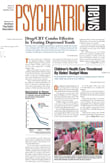Though much about the nation's mental health system remains to be improved, access to mental health care for the most seriously mentally ill has actually expanded—in contrast to the grim picture painted by many psychiatrists.
That's the message in a new study of mental health services utilization appearing in the July/August Health Affairs that was led David Mechanic, Ph.D., the René Dubos University Professor of Behavioral Sciences at Rutgers University, and Scott Bilder, also of Rutgers.
“I'm not arguing that things are good,” Mechanic told Psychiatric News. “But the sky isn't falling.”
The study, “Treatment Of People With Mental Illness: A Decade-Long Perspective,” uses retrospective data from community surveys of mental health care utilization during two time periods to show that access to care for those classified as “seriously mentally ill” has expanded over time.
Mechanic is also director of the Institute for Health, Health Care Policy, and Aging Research at Rutgers.
Yet one leader in psychiatry who reviewed the report disputed the conclusions and said that a careful analysis of data in the paper suggests precisely the opposite—that access to care for most mentally ill, including many seriously mentally ill people, has diminished.
“I think the emphasis is misleading in that the authors appear to be a making a case that far from getting worse, things are getting better,” said past APA president Paul Appelbaum, M.D. “If you read it carefully, however, there are qualifications buried in the paper. The average reader looking at this study would come away with the conclusion that psychiatrists are way off base in saying that there are declines in access to mental health care. And if that were true, one would have to wonder what accounts for the discrepancy between that impression and the data.
“But if you look very carefully at the data, you see that they don't in fact say everything that Mechanic suggests they say,” said Appelbaum, who is chair of the psychiatry department at the University of Massachusetts Medical School.
The study analyzed data from the Health-care for Communities survey, a nationally representative sample drawn from the household component of the Community Tracking Survey, fielded first from September 1997 to December 1998 (HCC1) and again from April 2000 to November 2001 (HCC2).
The HCC1 sample included 9,585 people. The HCC2 data provide information on a pair of overlapping subsamples: a follow-up sample from HCC1 and a new sample drawn from the second wave of the Community Tracking Survey.
Using those surveys, Mechanic and Bilder constructed a longitudinal sample of 6,659 people who completed both interviews.
They then divided the sample into three categories: those with serious mental illness (SMI), those with other mental illness (OMI), and those with no mental illness.
Inclusion in the SMI category depended on three criteria: a person had (1) received a diagnosis of schizophrenia or schizoaffective disorder from a doctor; (2) reported ever having been hospitalized for psychotic symptoms; and (3) reported major depressive symptoms during the prior 12 months, plus a report of a mania episode at some time in the person's life.
Those with mania or major depressive symptoms alone and those with dysthymia, generalized anxiety disorder, or panic disorder were classified in a second group as “other mental illness” (OMI).
Shift to Specialty Care Found
What the researchers found was that among those with SMI, the amount of care they received from primary care providers and from specialists was greater in HCC2 than in HCC1. The percentage of people with SMI who received specialty care increased from 39 percent in HCC1 to 51 percent in HCC2.
Among those who self-reported a need for mental health care—as opposed to those who received care but did not report needing it themselves—the increase is even larger, from 47 percent to 76 percent.
But at the same time, those with OMI who reported a need for mental health services received less specialty care in HCC2 than in HCC1. In HCC1, 73 percent of patients with OMI received specialty care, but in HCC2 only 65 percent received specialty care. “The data suggest a transfer of specialty care to the most seriously mentally ill,” Mechanic told Psychiatric News. “Services are being distributed so that [the seriously mentally ill] are getting more attention.”
Good News Emphasized
In the study, and in an interview with Psychiatric News, Mechanic emphasized that much about the nation's mental health system falls short of ideal. And he said the study findings say nothing about the quality of care that people receive.
The report notes that results from the Schizophrenia Patient Outcomes Research Team (PORT) study show that while medication treatment for acute episodes is now routine, dosage is often outside the appropriate range. The PORT study also reveals that other needed evidence-based care is usually lacking, particularly family education and support and vocational rehabilitation.
In addition, Mechanic's study acknowledges the difficulty of using self-reported need for care as an indicator.
“This indicator does not fully represent need as measured objectively, since stigma, loss of judgment due to illness, or other barriers make some people with SMI unwilling or reluctant to acknowledge need,” according to the study report. “Moreover, many people with distress and reduced functioning remain skeptical of mental health care and may be unaware of treatments that could be helpful. People with disorders who have no or limited health insurance and few resources also may be reluctant to acknowledge a need for care because of competing demands for their limited resources.”
Yet the study clearly emphasizes what it calls “good news”—that the most seriously mentally ill are receiving more care than they were previously.
And Mechanic underscored the discrepancy between what he says the data show and complaints by leaders in psychiatry about diminishing access to care. Among these are Appelbaum, who is quoted in the study lamenting “the progressive and systematic defunding of psychiatric services in Massachusetts and—despite some regional variation—in the United States as a whole.”
“There is some divergence between what psychiatrists have been saying and what the data show,” Mechanic acknowledged to Psychiatric News. “There is no question that there are significant difficulties, but there have always been. Are things getting worse? What I show is that by most indicators there are more services available, and more people with serious mental illness are receiving diagnoses and services.”
Yet Appelbaum said the qualifications within the report itself render Mechanic's conclusions difficult to support. And a more careful examination of the study design and data yields an entirely different conclusion, he said.
Appelbaum drew particular attention to the designations of “seriously mentally ill” and “other mentally ill,” noting that the criteria for inclusion in the SMI group potentially leaves out a great number of substantially disabled people for whom access has actually diminished.
The criteria would exclude anyone with recurrent severe depression; anyone who had mania but not depression in the previous 12 months, or anyone who had mania and depression, but 13 months prior; and those who might have been prescribed medication for psychosis but who did not report ever having been told by a physician that they had schizophrenia.
“This is a problem that goes beyond the issue of self-reporting to an extremely restrictive definition of what gets called serious mental illness,” Appelbaum said.
Moreover, Appelbaum said access to care for the SMI group is likely to have declined again since the HCC2 survey.
“The increase in access for this oddly defined group corresponds to a period of time when Medicaid rates and enrollment were rising,” he said.“ But in the last three years there has been a contraction in eligibility and covered services. We might well wonder if that group that did better during that period is not doing worse.
“The message ought to be that availability of care for people with mental illness is decreasing,” Appelbaum said. “And although there may be a subgroup—an oddly defined subgroup—who seem to be doing better, overall fewer people are receiving care.” ▪

